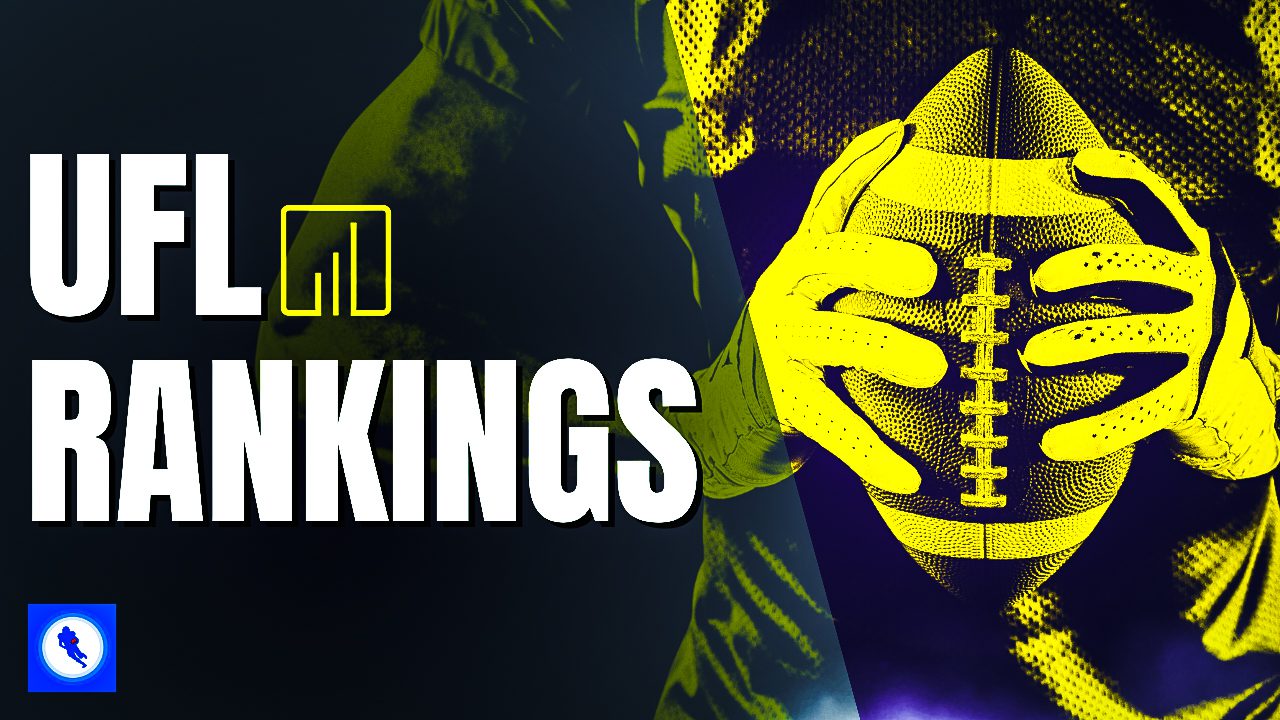Dynasty league fantasy football owners are preparing for 2020 rookie drafts. Scott Engel advises those with the first overall pick (1.01) on which running back is the better choice, Jonathan Taylor or Clyde Edwards-Helaire.
As we ready for upcoming dynasty rookie drafts, those at or near the top of the board are already speculating who may be the No. 1 overall choice. While the top possible pick may seem widely obvious to many owners, not everyone has the same thought processes or team needs.
It will be widely assumed that a running back will be taken No. 1 overall. It is simply the position of highest demand in any fantasy football format. But which one should be selected with the top choice?
While need may dictate which direction a dynasty owner will go, let's look at the two most likely candidates to decide which is the better choice.
Be sure to check all of our fantasy football rankings for 2025:- 2025 fantasy football rankings (redraft)
- Dynasty fantasy football rankings
- 2025 NFL rookie fantasy football rankings
- Best ball fantasy football rankings
- Quarterback fantasy football rankings
- Running back fantasy football rankings
- Wide receiver fantasy football rankings
- Tight end fantasy football rankings
The Case for Clyde Edwards-Helaire
Prior to the NFL Draft, some fantasy analysts had D’Andre Swift ranked as their No. 1 RB, and various others at second, including Jonathan Taylor, over Clyde Edwards-Helaire. I personally had Edwards-Helaire ranked first dynasty wise, because I viewed him as versatile and explosive. He also is willing to be physical when needed. I believe he is a more dynamic runner than Swift and he certainly has better pass-catching potential than Edwards.
Then Edwards-Helaire landed in the best offense in the NFL when he was drafted by Kansas City. The Chiefs do have postseason hero Damien Williams on the roster, but they have not been able to rely on him to stay healthy. Real Talk Raph has long preached that Williams is an injury concern on the RotoBaller SiriusXM Fantasy Sports Radio morning show, and he is correct. He has missed five games in two of the past three seasons. In 2017 he was not a starter for Miami and still played 11 games.
So it’s apparent that Kansas City needed a dependable RB, even if Williams remains in the picture. Most teams who do not have a workhorse running back are employing time shares or committees. There are no other rookie RBs who project to be prime and immediately-featured backs in this year’s class. So we must project who must be the most efficient in terms of fantasy production with the most upside in the shorter term, and who has the best chance to be an unquestioned NFL starter in the future.
Edwards-Helaire has the pedigree to make the most of every touch in 2020. In his final year at LSU, he rushed for 1,415 yards and 16 touchdowns on 215 carries. He also caught 55 balls for 453 yards. He accomplished those statistical feats as part of the nation’s No. 1 offense. So Edwards-Helaire knows how to mesh into an explosive offensive system.
The Chiefs do throw the ball more than LSU did, as they passed the ball 60.6 percent of the time last season, as compared to 54.3 for the Tigers. But there will always be adjustments at the pro level for any incoming player. Williams only carried the ball more than 17 times once and more than 15 times in four games last season. Edwards-Helaire will likely carry the ball less in the pros, but he is also a very significant potential weapon in the passing game. He also should be an effective goal line option. Edwards-Helaire has a low running base and runs very good routes.
Playing in the league’s most potent offense, Edwards-Helaire will get many chances to make notable plays as a runner and receiver and will have opportunities to finish drives near the goal line. There is a very good chance he will overtake Williams as the starter and can assume an even heavier workload if there is another Williams injury this season. The two may share some touches when both are available, which could lead to some initial unpredictability, but most of the top rookie RBs find themselves in similar situations. An important factor to remember is that Edwards-Helaire was drafted because the Chiefs seemingly don’t believe they can rely on Williams over a full season.
Here is one key fact to keep in mind regarding the Edwards-Helaire situation. Williams is an unrestricted free agent after 2020, so the rookie will be groomed to take over as the eventual clear lead RB after this season. In the meantime, he should be very efficient with a lot of statistical promise.
| Year | Team | G | Att | Att/G | Yds | Yds/G | TD |
| 2019 | KC | 11 | 111 | 10.1 | 498 | 45.3 | 5 |
| 2018 | KC | 16 | 50 | 3.1 | 256 | 16 | 4 |
| 2017 | MIA | 11 | 46 | 4.2 | 181 | 16.5 | 0 |
Damien Williams' regular season games played and rushing workloads over the past three seasons via NFL.com. This is a snapshot of an unreliable running back.
Jonathan Taylor over Clyde Edwards-Helaire?
There are some fantasy analysts that are higher on Taylor than Edwards-Helaire. I do believe Taylor is the best pure runner in this year’s draft class. He put up some marvelous numbers at Wisconsin and raised his stock more at the combine. Taylor rushed for over 2,000 yards twice and almost turned the trick three times. He set NCAA records for most 200-yard rushing games (12) and the most rushing yards in the first three seasons of a career (6,174). He rushed for 50 TDs in three seasons, including 21 in 2019.
Taylor has star potential for sure, both in fantasy and real life. But his receiving abilities can be questioned. He only caught 42 balls in three seasons, with 26 receptions last year. He did catch five TD passes last year, so there is a glimmer of hope there. But Nyheim Hines seems entrenched for now as the Colts’ receiving specialist at RB.
Indianapolis seems set on moving on from Marlon Mack, who is an unrestricted free agent after this season, too. He did not rush for 80 yards in nine of 14 games last year and Taylor projects to be a much more productive runner. So both Edwards-Helaire and Taylor figure to be lead running backs for their respective offenses in 2021.
| WK | ATT | YDS |
| 2 | 20 | 51 |
| 3 | 16 | 74 |
| 4 | 11 | 39 |
| 7 | 18 | 44 |
| 8 | 19 | 76 |
| 10 | 19 | 74 |
| 14 | 13 | 38 |
| 15 | 11 | 19 |
| 17 | 15 | 77 |
Marlon Mack played in 14 games last season. In nine of them here via NFL.com, he did not rush for 80 yards.
The Verdict and Strategical Approach
It comes down to Edwards-Helaire or Taylor for the top overall choice. Both will be eased into significant roles as rookies with eyes on becoming lead RBs in their second seasons. But Edwards-Helaire plays in a better offense and is the superior pass-catcher. Taylor must prove himself as a receiver in the NFL. So Edwards-Helaire gets the nod from me in PPR formats.
Cam Akers has a chance to start more quickly in the NFL, and also has been more productive overall as a pass-catcher at the college level. If you need a RB who makes a more imemdiate fantasy impact than Taylor you may want to consider Akers as the No. 2 RB in PPR formats. D’Andre Swift is also more versatile than Taylor and could eventually become a lead back as well, although his path to the RB1 job on his team is less clear than the others.
So if you pick first in a PPR league, take Edwards-Helaire. At the second slot, you should go with Akers if you need more immediate help if Edwards-Helaire is selected first. Otherwise Swift may make more sense for you as the better PPR producer in the longer term. If you can afford to be patient, you can also opt for Taylor and hope he improves as a receiver over time. Both Swift and Taylor may be better longer-term options than Akers.
In standard formats, though, Taylor can be the first choice. He projects to be the most productive rusher of the four. Don’t be overly concerned about his heavy college workload. There are only three college seasons of production so far and you cannot be scared off drafting him when you consider that many NFL running backs don’t have extensive career expectations.
Verdict: Edwards-Helaire first in PPR/Half-PPR leagues, Taylor first in standard formats.
 RADIO
RADIO


























